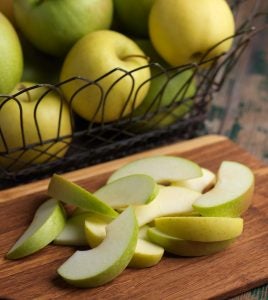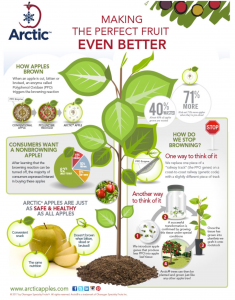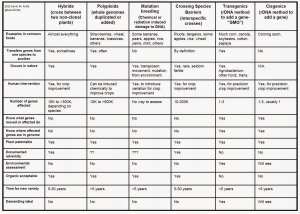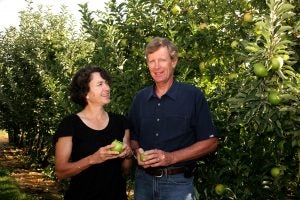Everything we eat has had their genes modified by humans. Everything. In nature, carrots were originally white, eggplants looked like eggs, corn was a tiny grass, apples and peaches were very small and extremely bitter, just to name a few.
So why do some people fear the word “GMO?” Well, I believe people fear what they don’t understand. People hear the word “GMO” and feel it sounds like a gross mutation, something “icky” that they shouldn’t put in their bodies. Maybe to them it means more chemicals or something. Maybe they get created in a lab. Maybe it means unnatural.
But here’s the deal: Everything I just mentioned can apply to all other plants, including organic and non-GMO. The term “GMO” is somewhat of a misnomer since all food is “genetically modified” to an extent, but the non-GMO label makes for a great marketing tactic for some food companies to increase sales! What we need to remember is that modification offers many benefits to farmers and consumers.

Enter the Arctic Apple. This apple will soon be hitting store shelves, and I, for one, am pretty excited to try it. The Arctic Apple was developed by Neal and Louisa Carter from British Columbia, Canada. This is a small company by comparison called Okanagan Specialty Fruits, and they were created to get people more excited about fruit. Neal has worked with various crops around the globe for 30 years, and the great thing about these apples is they don’t turn brown after you cut or bite into them. They act like any other apple in the orchard and there are over 7,500 kinds of apples grown around the world. Since the Arctic Apple doesn’t brown, the idea is to reduce food waste. Parents can pack apple slices in their kids’ lunch boxes and not worry about them spoiling. More people can eat apples and not worry about brown spots and bruising. Baking possibilities are endless. If apple slices can sit out at an event or potluck, hopefully more people will reach for this more attractive, healthy snack.
The is gene technology where two genes inside the apple were switched to shut off the polyphenolic oxidase enzyme, which causes the browning of apples once sliced. For more info on how the plant breeding process works specifically, click here.

I don’t believe people should say “no” to “GMO.” I believe people should strive to understand the science and say “know” to GMO. How does silencing a gene compare to “organic” ruby red grapefruits created through mutagenesis? What about seedless watermelons and grapes? How do some plants, like the arctic grape, get away with undergoing no testing while others are scrutinized? Scientifically it makes no sense, and this is why education is so important.
The consumer-centric benefits of the Arctic Apple could open doors to the public’s understanding and greater acceptance of crop genetics. So often, GMOs are geared toward farmers and helping to reduce the use of pesticides and other chemicals, but here with the apples, consumers will literally be able to see first-hand why GMOs are the technology of our food future and how they can help feed a growing population in a nutritious way.
I highly recommend reading this link to understand the differences in plant breeding methods as written by Dr. Kevin Folta, professor and chairman of the horticultural sciences department at the University of Florida, Gainsville. Let’s take the “Franken” out of “Frankenfood.”

Hopefully this further helps explain plant breeding. “GMO” does not mean scary. It does not mean Monsanto. It does not mean chemicals. It just means that scientists, farmers, and plant breeders today are able to do what they’ve already been doing for centuries, except that technology today allows them to do their jobs better and more precise than ever before. So be sure to grab an Arctic Apple when it hits stores.
Michelle Miller, the Farm Babe, is an Iowa based farmer, writer, and public speaker who works to bridge the gap between farmers, scientists, and consumers. She believes education is key in terms of helping consumers understand how food is produced, scientifically, without all the marketing gimmicks!




